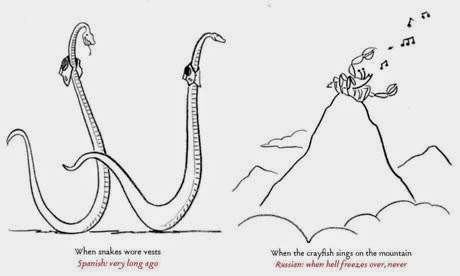Literally vs. Figuratively: Going the Idiomatic Way
Idioms are not always easy to understand. Sailing in the same boat; having your cake and eating it too; a penny for your thoughts; adding insult to injury; at the drop of a hat. You’re no doubt familiar with all of these and plenty more.
Native speakers have a way with their language. It’s filled with wise sayings, metaphors that are unique to the language. They are rather like proverbs, only shorter, with a figurative rather than a literal meaning. They are a dialect, a jargon that natives of a particular language use.
The English language has more than 25,000 idioms and counting!!
Figurative Not Literal
For instance, ‘at the drop of a hat’ has nothing to do with hats. It just means doing something immediately or without any doubts or hesitation.
Stepping into someone’s shoes does not mean literally doing so. That wouldn’t be very well received.
Jokes apart, it means that the person is taking over a role from someone else or filling their role instead.
- Must Read – Top 5 Best Engineering Schools in the World
Why Idioms?
So why do you use idioms? Well, I guess it makes the language more colorful and makes you sound more like a native speaker. It’s a part of the language evolution and people speaking all languages have their own native idioms.
It makes the language more dynamic and adds an amazing illustration to your speech. English idioms are mysterious and fun to explore.
Your journey to learning English Idioms starts right now. That’s what this post is all about, so let’s begin the journey (see that? We’re not traveling anywhere, just starting out on something):
Wind your Neck In
A very polite way of saying: shut up or pipe down.
When will you ever change your attitude? When hell freezes over. (Meaning never)
This story takes place when snakes wore vests (a very long time ago)

- Also Read – Grammar Mistakes to Avoid at all Times
-
1Idioms in Context
It’s quite a challenge to understand idioms out of context, especially if you are not a native speaker of the language. So here are some contextual hints for idiomatic phrases. Let’s see if you can get to the bottom of these (understand them) and get the gist (get the main idea) of these common idioms.
Michael is a successful man of the world and is a household name. He is good at showing the ropes to his employees. However, all was not smooth sailing for Michael from the beginning, for he was not born with a silver spoon. The first lesson he learned was that success is not manna from heaven. His was a rags to riches story.
He learned that one must never have too many irons in the fire or too many eggs in a basket. You should also be busy as a bee and must always put on your thinking cap. Another thing to remember is that you need to know which side of the bread is buttered, in order to ride the gravy train.
His advice to other entrepreneurs was that they must always keep an eye on the ball and be quick on the uptake. Be consistent but don’t spread yourself too thin. Never show one’s hand to the competition.
Okay, answer time!
- Man of the world: a sophisticated man.
- Become a household name: become very popular.
- Showing the ropes: teaching someone how things are done.
- Smooth sailing: easy and problem free life.
- Born with a silver spoon: born rich.
- Manna from heaven: being blessed with riches.
- Rags to riches: being poor initially and then rich.
- Busy as a bee: always doing something.
- Too many irons in the fire: engaging in too many activities.
- Put on the thinking cap: start focusing or concentrating.
- Knowing which side of the bread is buttered: understanding which person or thing is more important to you and behaving accordingly.
- Riding the gravy train: Making money by doing something which is already a proven success.
- Spread yourself too thin: engaging in several activities with the result that you don’t perform well.
- Show one’s hand: reveal one’s plans.
That was a mouthful!! (Something long or difficult)

-
2Story Time
I just finished reading a story about an Odd man out. It’s about Remy, a man who lived out of his suitcase.
He had tightened the belt all his life and had managed to save some money. He decided to throw in the towel and lead the life of a free bird. He had made hay when the sun shone.
Yet, he felt that he was not seeing the forest for the trees. He wondered how long he could continue to live this way working from dawn to dust. However, he kept his cards close to his chest and waited till he got all the ducks in a row. He wanted a plan and knew that no decision could be made on the spur of the moment.
Within a twinkling of an eye, things could go topsy turvy. He remembered his Uncle Joe, who was the salt of the earth. Uncle Joe was a jack of all trades and always got by in life.
One fine day, Remy announced that he was leaving his job. His friends were open mouthed: How can you just throw everything down the drain? You’ve lost your marbles, said some others. Yet, Remy was ready for a new chapter.
- You May Like – How to Write Kick-Ass, Engaging and Catchy Blog Titles
-
3Getting the Gist
- Odd man out: someone who doesn’t fit in with the rest.
- Living out of your suitcase: living with limited resources.
- Tighten the belt: live frugally without spending much.
- Throw in the towel: give up or break off.
- Life of a free bird: live a carefree life.
- Making hay when the sun shines: making money or taking advantage when there are opportunities.
- Not Seeing the forest for the trees: Missing out the whole picture, as you are too focused on the smaller, unimportant details.
- Dawn to dust: all day long.
- Keeping cards close to the chest: not revealing your plans.
- Getting all ducks in a row: getting everything sorted out.
- Spur of the moment: Immediately or without consideration.
- Twinkling of an eye: within a few seconds.
- Topsy turvy: changing completely.
- Salt of the Earth: somebody trustworthy or straightforward.
- Jack of all trades: a person with many skills.
- Get by: manage to make a living.
- Open mouthed: amazed, shocked.
- Throw down the drain: Waste or discard.
- Losing one’s marbles: going crazy or mad.
- A new chapter: new or fresh beginnings in life.


























